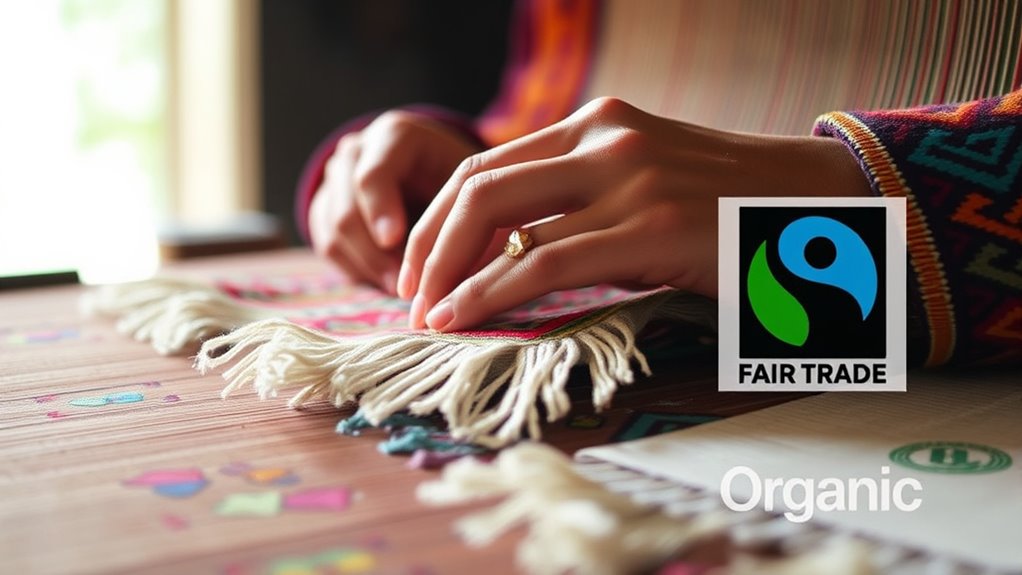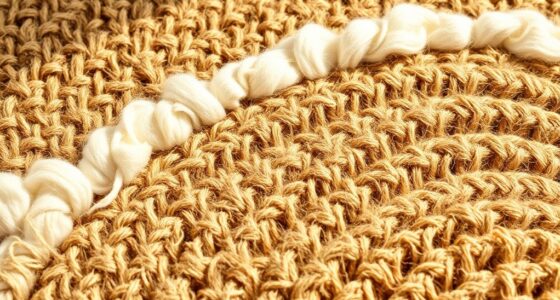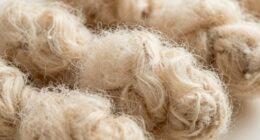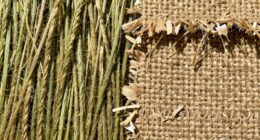To verify fair-trade certifications in ethical weaving, look for well-known labels like Fairtrade or Rainforest Alliance on product packaging. Check their authenticity by consulting official certification databases, examining the labels carefully, and confirming the certifying organization’s credibility. Ask sellers about sourcing practices and production conditions. Watch for red flags like vague info or inconsistencies. Supporting transparent artisans guarantees your purchase aligns with your values—if you keep exploring, you’ll find ways to make truly responsible choices.
Key Takeaways
- Check for well-known fair-trade labels like Fairtrade Mark, FLO, or Rainforest Alliance on woven products.
- Verify certification authenticity through official databases or certifier websites using batch or producer information.
- Ensure the certification is current and properly displayed on the product packaging before purchasing.
- Request detailed information from artisans or suppliers about sourcing, wages, and working conditions.
- Look for third-party verification or credible testimonials confirming responsible and ethical weaving practices.
Understanding the Significance of Fair-Trade Labels
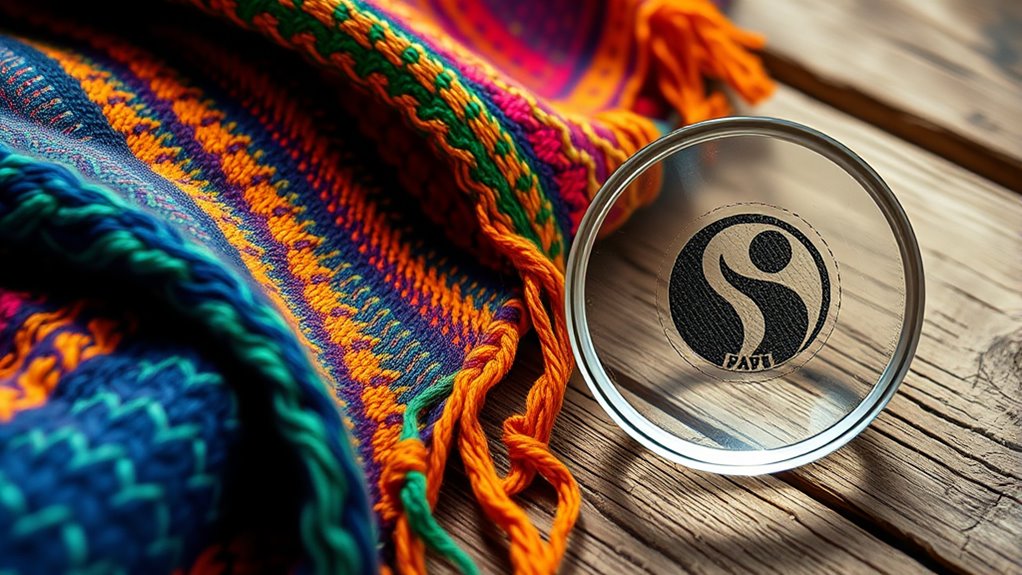
Have you ever wondered what a fair-trade label really signifies? It’s more than just a sticker; it’s a guarantee that certain ethical standards are met. When you see this label, you know the product was produced under fair working conditions, with fair wages, and without exploitation. Fair-trade certification also emphasizes sustainable practices, ensuring environmental responsibility. It empowers farmers and workers by giving them better market access and a stronger voice. By choosing products with this label, you support communities endeavoring for fair treatment and improved living conditions. This label helps you make mindful purchasing decisions, aligning your values with your buying habits. Understanding what a fair-trade label stands for helps you contribute to a more ethical and equitable global economy. Additionally, certifications such as quality assurance standards often involve rigorous testing of production processes to maintain integrity and trust.
Recognizing Common Fair-Trade Certification Marks

How can you quickly identify if a product is genuinely fair-trade certified? Start by looking for well-known certification marks on packaging. The Fairtrade Mark, for example, features a distinctive green and black logo with a stylized person. The FLO (Fairtrade International) logo is another recognized symbol, often accompanied by the words “Fairtrade.” You might also see the Fair for Life or the Rainforest Alliance symbols, which indicate different fair-trade standards. These marks are usually prominently displayed on the product’s front or side. Familiarizing yourself with these common symbols makes it easier to spot genuine fair-trade products at a glance. Always check that the mark appears authentic and is not a counterfeit or misrepresented logo. Recognizing these marks helps ensure your purchase supports fair and ethical practices, and understanding fair-trade certification standards further aids in making informed choices.
Investigating the Certification Bodies and Their Credibility
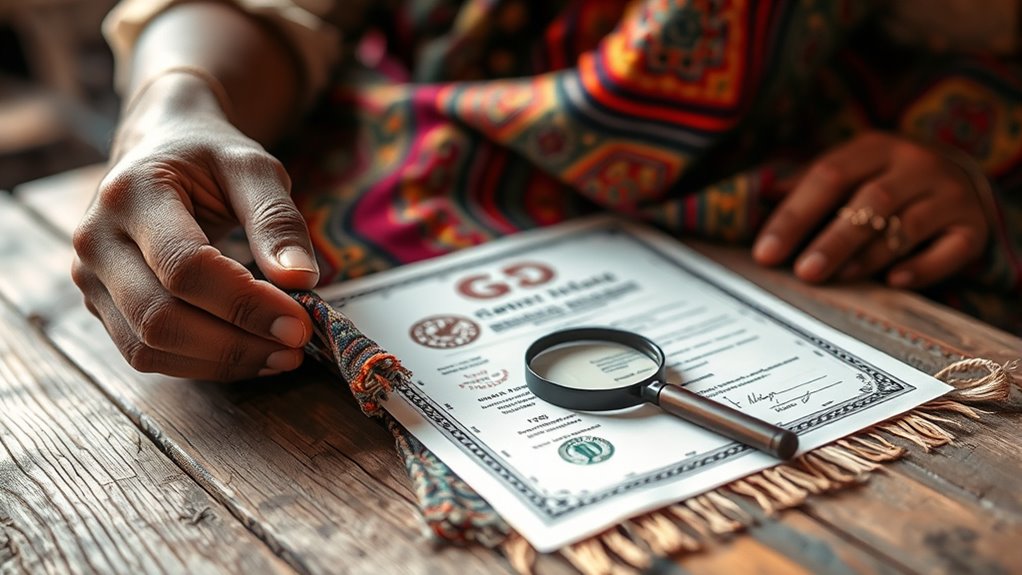
To guarantee a certification body’s credibility, you need to examine their standards and how rigorously they apply them. Verifying the accreditation credentials confirms whether they meet recognized industry benchmarks. This way, you can trust that the certification genuinely reflects ethical practices.
Certification Body Standards
When evaluating certification bodies, one of the most critical factors is their credibility and adherence to strict standards. You need to examine their certification criteria closely—are they transparent, exhaustive, and aligned with recognized international norms? Check if they clearly define social, environmental, and economic requirements, and whether they update these standards regularly. Certification body standards should also include procedures for impartiality, conflict of interest management, and ongoing monitoring. You want a body that enforces consistent auditing processes and maintains rigorous documentation. If standards are vague or inconsistent, the certification’s credibility drops. Ultimately, strong certification body standards ensure that the labels you trust genuinely reflect ethical practices, providing peace of mind that the products meet high, verifiable fair-trade principles. Additionally, assessing their standard enforcement procedures helps confirm their commitment to maintaining credible certification practices.
Verifying Accreditation Credentials
Evaluating certification body standards lays a strong foundation, but verifying their accreditation credentials confirms whether those standards are recognized and trustworthy. You should check if the certification body is accredited by reputable organizations like ISO or national accreditation bodies. These agencies assess whether the certifier meets rigorous criteria for competence and impartiality. Look for accreditation details on the certifier’s website or official documents. If they lack proper accreditation, their certifications might not hold weight or could be easily questioned. Confirming accreditation helps ensure the certifier operates transparently and adheres to international standards. Additionally, assessing independent verification processes can provide further assurance of the certification’s credibility. This step safeguards you from counterfeit or unreliable certifications and gives you confidence that the fair-trade claims are genuinely verified by a credible authority.
How to Read and Interpret Fair-Trade Labels
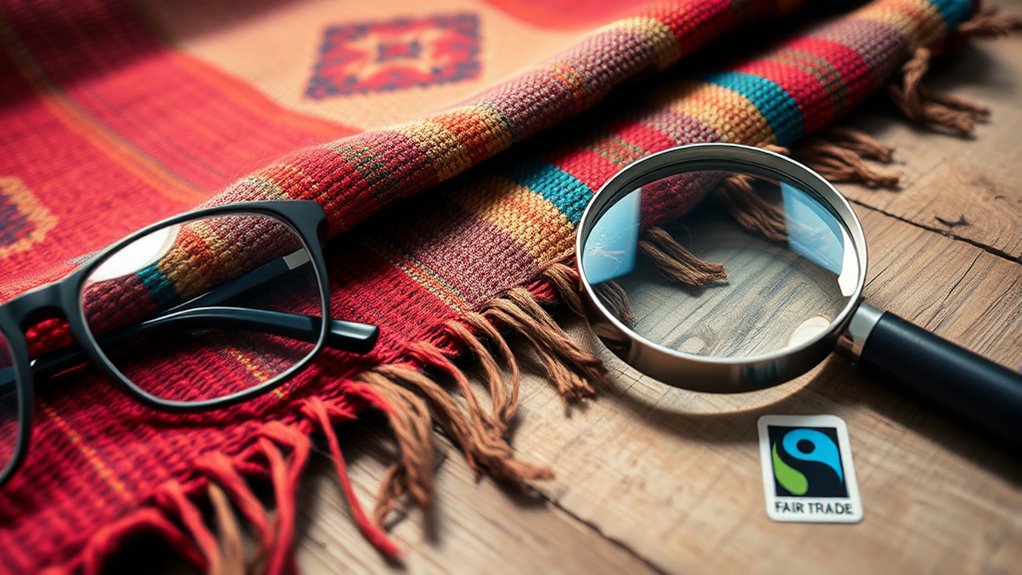
Understanding fair-trade labels can seem confusing at first, but they’re key to making ethical purchasing decisions. To interpret them effectively, look for clear certification seals, which indicate the product meets specific fair-trade standards. Next, check the label for details like the certifying organization’s name and logo—these add credibility. Finally, read any accompanying text for information on the producer’s community benefits or environmental practices.
Here’s how to approach it:
- Confirm the label has an official certification seal.
- Verify the certifying organization’s name and logo are present.
- Look for additional info about social and environmental impacts.
Verifying Certification Through Official Databases

To guarantee a product’s fair-trade certification is legitimate, you should verify it through official databases maintained by certifying organizations. These databases allow you to check if the product’s certification is current and valid. Start by locating the certifying body’s website—common organizations include Fair Trade International or FLO. Once there, enter the certification number or product details, such as batch or lot number, if available. This quick search confirms whether the product was genuinely certified at the time of purchase. Keep in mind, some organizations also provide downloadable lists of certified producers and partners. Verifying through these official sources ensures you’re not relying solely on labels or claims but on verified, up-to-date information, helping you make truly ethical purchasing decisions. Additionally, being aware of certification hours can help you verify the timing of your purchase relative to certification updates.
Questions to Ask When Purchasing Fair-Trade Textiles
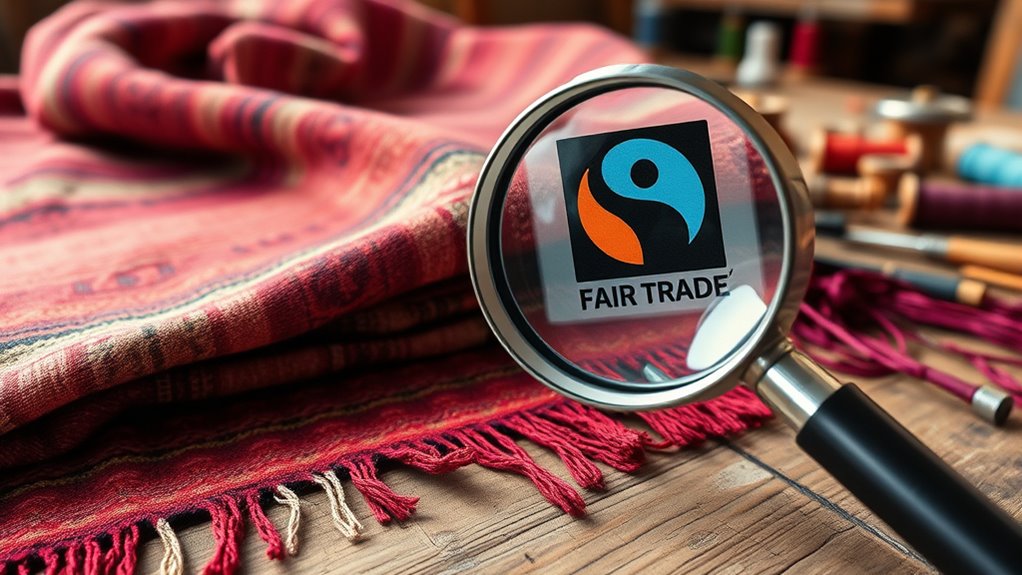
When buying fair-trade textiles, you should ask about certification authenticity to guarantee the product truly meets fair-trade standards. It’s also important to inquire about producer transparency indicators and how much detail is shared about the supply chain. These questions help you verify that your purchase supports ethical practices at every step. Additionally, understanding the benefits of practicing stillness can promote more mindful and ethical consumption choices by fostering greater self-awareness and reflection.
Certification Authenticity Checks
Ever wondered how to verify if a fair-trade textile truly meets ethical standards? One way is to perform certification authenticity checks. First, always ask to see the official certification label or document, and verify it directly with the certifying organization. Second, research the certifier’s reputation—are they well-regarded and recognized globally? Third, check for any recent updates or reviews that confirm the certification’s validity. Additionally, inspecting the quality of certification labels can help determine their authenticity and prevent counterfeit claims. By actively engaging with these steps, you ensure the product genuinely meets fair-trade standards. Don’t rely solely on store claims or packaging; do your homework. Authentic certifications are your best safeguard against misleading claims, helping you support ethical practices and fair treatment for producers.
Producer Transparency Indicators
Verifying the authenticity of certifications is a vital step, but understanding how producers operate adds another layer of confidence in your purchase. Ask questions about their practices, such as how they ensure fair wages and safe working conditions. Look for transparency around their production processes, including sourcing materials and labor policies. Do they share information about their farm or factory inspections? Are they open about their community engagement initiatives? Producer transparency indicators also include whether they provide detailed documentation or stories about their workers and their environment. When purchasing fair-trade textiles, your goal is to see clear, honest communication from producers. This helps confirm that their operations align with ethical standards and that your purchase genuinely supports fair and sustainable practices. Additionally, understanding the Louisiana alimony laws and the factors influencing awards can help consumers make informed choices about supporting ethical producers who prioritize fair treatment and equitable practices.
Supply Chain Transparency
How can you guarantee that the textiles you purchase truly come from transparent and responsible supply chains? Start by asking these key questions:
- Can the seller provide detailed information about each stage of the supply chain? Look for traceability from raw materials to finished products.
- Are suppliers and workers’ rights clearly documented and verified? Ensure fair wages, safe conditions, and ethical labor practices.
- Is there third-party verification or certification supporting their claims? Certifications like Fair Trade or B Corp add credibility.
Spotting Red Flags and Potential Misrepresentations

Are there clear signs that someone might be misrepresenting themselves or their intentions? Look out for vague or inconsistent information about their certifications or sourcing practices. If a supplier claims to be fair-trade but cannot provide verifiable documentation, that’s a red flag. Beware of overly aggressive marketing tactics or pressure to make quick decisions—these often hide questionable practices. Check for discrepancies between their claims and the details on their official certifications or reports. Unclear origins, lack of transparency about supply chains, or refusal to share third-party audit results are warning signs. Trust your instincts and ask detailed questions. If answers are evasive or unsatisfactory, it’s best to reconsider. Spotting these red flags helps protect you from supporting unethical practices. Additionally, being aware of the cycle of breakups can remind you to stay cautious and attentive to consistency in their claims and actions.
Supporting Transparent and Responsible Artisans

Supporting transparent and responsible artisans means actively choosing partners who openly share their sourcing practices, production processes, and ethical commitments. You want to work with artisans who prioritize honesty and accountability. To do this, consider these steps:
- Ask for detailed information about their sourcing and manufacturing methods.
- Look for clear evidence of ethical standards, like fair wages and safe working conditions.
- Seek out testimonials or third-party certifications that verify their responsible practices.
- Be aware of fair-trade certifications that can help verify the legitimacy of their ethical claims.
Tips for Making Ethical Shopping Choices
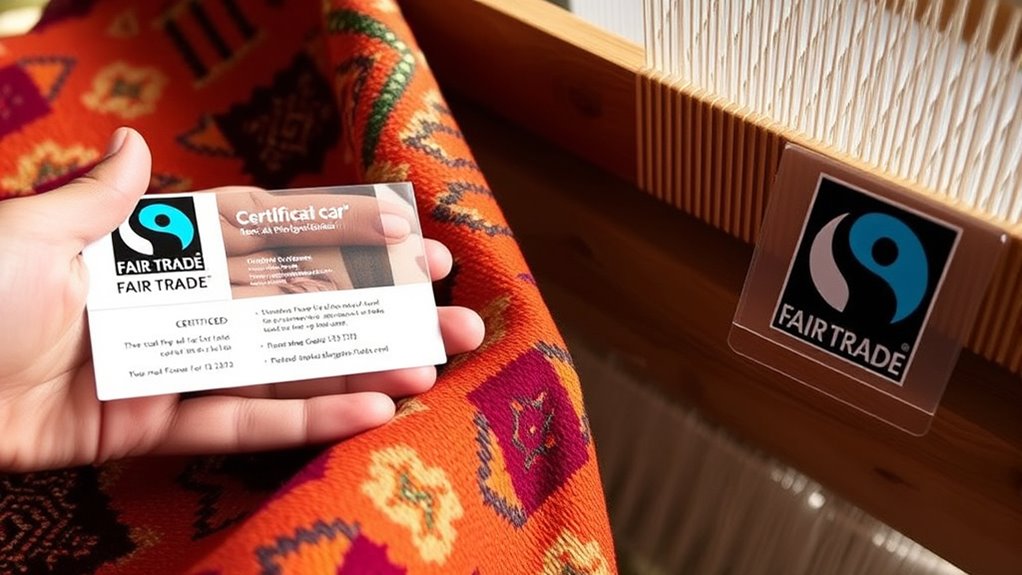
Choosing ethically made products starts with mindful shopping habits. Always research brands before buying—look for clear information about their sourcing and labor practices. Check for trusted certifications like Fair Trade or GOTS, which verify ethical standards. When shopping online, read reviews and transparency reports to gauge a company’s commitment to fair practices. Consider supporting local artisans or small businesses that prioritize sustainability and fair wages. Avoid impulse purchases; instead, plan your shopping to focus on quality over quantity. Be skeptical of vague marketing claims and ask questions about how products are made. By staying informed and intentional, you empower ethical production and make choices that align with your values. Small, consistent actions can considerably impact promoting fairness and sustainability in your community.
Frequently Asked Questions
How Can Consumers Verify Fair-Trade Claims Without Official Labels?
You can verify fair-trade claims without official labels by researching the company’s sourcing practices and supply chain transparency. Look for detailed information on their website about their partnerships and ethical standards. Reach out directly to ask about their fair-trade certifications or policies. Additionally, seek third-party audits or reports that confirm their claims. By staying informed and asking questions, you guarantee your purchases support genuinely ethical practices.
Are There Differences in Fair-Trade Standards Across Certification Bodies?
Did you know there are over 30 fair-trade certification bodies globally? When comparing standards, you’ll find notable differences. Some organizations emphasize environmental sustainability, while others focus on workers’ rights and fair wages. You should research each certifier’s criteria, as not all standards are equal. By understanding these variations, you can better evaluate the credibility of fair-trade claims and make more informed ethical shopping choices.
What Role Do Local Communities Play in Fair-Trade Certification Processes?
You play a crucial role in fair-trade certification processes by supporting and engaging with local communities. Your involvement helps guarantee their voices are heard and respected, fostering transparency and trust. When you buy fair-trade products, you’re directly contributing to community development, fair wages, and sustainable practices. Your awareness encourages producers to adhere to fair standards, ultimately empowering communities to improve their livelihoods and preserve their cultural heritage.
How Do Fair-Trade Certifications Impact Environmental Sustainability?
Think of fair-trade certifications as a green thumb for the environment. They encourage you to adopt eco-friendly practices, reducing pollution and conserving resources. By supporting certified products, you help farmers and artisans implement sustainable methods like organic farming and waste reduction. This ripple effect not only preserves ecosystems but also guarantees that future generations can enjoy a healthier planet, making your choices impactful and environmentally responsible.
Can Fair-Trade Labels Guarantee No Exploitation in the Supply Chain?
You might wonder if fair-trade labels can fully guarantee no exploitation in the supply chain. While they substantially reduce the risk by setting standards and requiring audits, they can’t eliminate all issues. Certification programs rely on transparency, honest reporting, and inspections, but some unethical practices can still slip through. So, while fair-trade labels improve conditions, you should remain aware that they aren’t absolute guarantees against exploitation.
Conclusion
By paying close attention to fair-trade labels and doing a bit of research, you can make ethical choices that support responsible artisans. Sometimes, a quick glance at a certification mark or a check in official databases reveals more than you’d expect—like a hidden story behind your textile. Remember, your mindful shopping not only empowers workers but also keeps the integrity of fair-trade alive, turning everyday purchases into meaningful acts of support.
